Love's Labour's Lost is one of William Shakespeare's early comedies, believed to have been written in the mid-1590s for a performance at the Inns of Court before Queen Elizabeth I. It follows the King of Navarre and his three companions as they attempt to forswear the company of women for three years of study and fasting, and their subsequent infatuation with the Princess of France and her ladies. In an untraditional ending for a comedy, the play closes with the death of the Princess's father, and all weddings are delayed for a year. The play draws on themes of masculine love and desire, reckoning and rationalization, and reality versus fantasy. Though first published in quarto in 1598, the play's title page suggests a revision of an earlier version of the play. While there are no obvious sources for the play's plot, the four main characters are loosely based on historical figures. The use of apostrophes in the play's title varies in early editions, though it is most commonly given as Love's Labour's Lost. The historical personages portrayed and the political situation in Europe relating to the setting and action of the play were familiar to Shakespeare's audiences. Scholars suggest that the play lost popularity as these historical and political portrayals of Navarre's court became dated and less accessible to theatergoers of later generations. The play's sophisticated wordplay, pedantic humour and dated literary allusions may also be reasons for its relative obscurity, as compared with Shakespeare's more popular works. Love's Labour's Lost was staged rarely in the 19th century, but it has been seen more often in the 20th and 21st centuries, with productions by both the Royal Shakespeare Company and the National Theatre, among others. It has also been adapted as a musical, an opera, for radio and television and as a musical film.

200 Meisterwerke der Literaturgeschichte : Die größten Klassiker der Weltliteratur
Franz Kafka, Victor Hugo, Fjodor Michailowitsch Dostojewski, Lord Byron, Giacomo Leopardi, Marcel Proust, Henrik Ibsen, Percy Bysshe Shelley, Charles Dickens, Jane Austen, Mary Shelley, Emily Brontë, Charlotte Brontë, Anne Brontë, William Makepeace Thackeray, Bram Stoker, Henry Fielding, George Eliot, William Shakespeare, D. H. Lawrence, Walt Whitman, Herman Melville, Thomas Wolfe, Virginia Woolf, Joseph Conrad, Sinclair Lewis, Lewis Carrol, Edgar Allan Poe, Edward Bulwer-Lytton, Oscar Wilde, H. G. Wells, Daniel Defoe, James Fenimore Cooper, Lew Wallace, Jonathan Swift, Robert Louis Stevenson, Mark Twain, Walter Scott, Nathaniel Hawthorne, Harriet Beecher Stowe, Laurence Sterne, Frances Hodgson Burnett, Arthur Conan Doyle, Wilkie Collins, Edgar Wallace, Jack London, Henry David Thoreau, John Galsworthy, F. Scott Fitzgerald, Rudyard Kipling, G. K. Chesterton, Washington Irvin, O. Henry, Ambrose Bierce, Alexander Sergejewitsch Puschkin, Michail Lermontow, Iwan Sergejewitsch Turgenew, Leo Tolstoi, Nikolai Gogol, Iwan Gontscharow, Nikolai Leskow, Anton Pawlowitsch Tschechow, Maxim Gorki, François Rabelais, Jean de la Fontaine, Blaise Pascal, Pierre Corneille, Moliere, Jean Baptiste Racine, Charles Perrault, Voltaire, Denis Diderot, Jean Jacques Rousseau, Pierre Ambroise Choderlos de Laclos, Antoine-François Prévost, Marquis de Sade, François René Chateaubriand, Stendhal, Honoré de Balzac, Alexandre Dumas, Alphonse de Lamartine, George Sand, Gustave Flaubert, Emile Zola, Guy de Maupassant, Alphonse Daudet, Jules Verne, Joris-Karl Huysmans, Prosper Mérimée, Charles Baudelaire, Stéphane Mallarmé, Arthur Rimbaud, André Gide, Arthur Schopenhauer, Heinrich Heine, Friedrich Schiller, Johann Wolfgang von Goethe, Jacob Grimm, Gottfried von Straßburg, Wolfram von Eschenbach, E. T. A. Hoffmann, Annette von Droste-Hülshoff, Heinrich von Kleist, Friedrich Hölderlin, Theodor Fontane, Gustav Freytag, Gottfried Keller, Theodor Storm, Stefan Zweig, Joseph von Eichendorff, Klaus Mann, Rainer Maria Rilke, Johanna Spyri, Joseph Roth, Karl May, Robert Musil, Heinrich Mann, Sigmund Freud, Friedrich Nietzsche, Dante Alighieri, Giovanni Boccaccio, Giacomo Casanova, Luigi Pirandello, Giosuè Carducci, Gabriele D'Annunzio, Niccolo Machiavelli, Miguel Cervantes de Saavedra, Pedro Calderón de la Barca, Vicente Blasco Ibañez, Knut Hamsun, Homer, Äsop, Herodot, Thukydides, Xenophon, Platon, Aristoteles, Sophokles, Euripides, Aristophanes, Laotse, Konfuzius, Siddhartha Gautama Buddha, Titus Livius, Tacitus, Marcus Tullius Cicero, Vergil, Ovid, Lukian, Petronius, Apuleius, Longos von Lesbos, Mark Aurel, Aurelius Augustinus
book
Unvergessliche Liebesromane der britischen Literatur : Jane Eyre, Große Erwartungen, Die Braut von Lammermoor, Stolz und Vorurteil, Emma, Sturmhöhe, Erloschenes Licht
Jane Austen, Charlotte Brontë, William Shakespeare, Walter Scott, Frances Burney, Emily Brontë, Anne Brontë, Charles Dickens, Rudyard Kipling, George Eliot, Nathaniel Hawthorne, D. H. Lawrence, Daniel Defoe, Lew Wallace, F. Scott Fitzgerald
book
The Tragedy of Julius Caesar
William Shakespeare
audiobookbook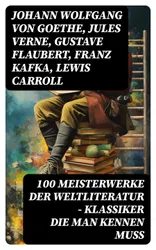
100 Meisterwerke der Weltliteratur - Klassiker die man kennen muss
Johann Wolfgang von Goethe, Jules Verne, Gustave Flaubert, Franz Kafka, Lewis Carroll, Selma Lagerlöf, Sigmund Freud, Johanna Spyri, Theodor Storm, Rainer Maria Rilke, Charles Dickens, Stefan Zweig, Heinrich Heine, Honoré de Balzac, Theodor Fontane, Karl May, Gottfried Keller, Mark Twain, Heinrich Mann, Else Lasker-Schüler, Robert Musil, Walt Whitman, Oscar Wilde, Annette von Droste-Hülshoff, Arthur Schopenhauer, Robert Louis Stevenson, Gustav Freytag, James Fenimore Cooper, Edgar Allan Poe, Heinrich von Kleist, William Shakespeare, Dante Alighieri, Charlotte Brontë, Emily Brontë, Jack London, Arthur Conan Doyle, Joseph Conrad, Jane Austen, Herman Melville, Guy de Maupassant, Walter Scott, Jonathan Swift, Jacob Grimm, Wilhelm Grimm, Alexandre Dumas, Rudyard Kipling, Nathaniel Hawthorne, Homer, O. Henry, Voltaire, Lew Wallace, John Galsworthy, E. T. A. Hoffmann, Marcus Aurelius, Hans Christian Andersen, Anton Pawlowitsch Tschechow, Platon, Friedrich Nietzsche, Iwan Sergejewitsch Turgenew, Tacitus, Nikolai Gogol, Miguel de Cervantes, Mary Shelley, Thomas Wolfe, Emile Zola, Fjodor Michailowitsch Dostojewski, Leo Tolstoi, Joseph Roth, Joseph von Eichendorff, Kurt Tucholsky, Iwan Alexandrowitsch Gontscharow, Oswald Spengler, Moliere, Alfred Adler, Sophie von La Roche, Klaus Mann, Rumi
book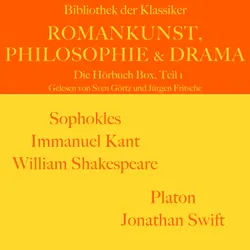
Romankunst, Philosophie und Drama: Die Hörbuch Box, Teil 1 : Bibliothek der Klassiker
Sophokles, Immanuel Kant, William Shakespeare, Platon, Jonathan Swift
audiobook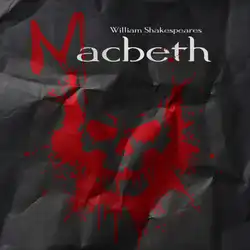
MacBeth
William Shakespeare
audiobookbook
William Shakespeare: Ein Sommernachtstraum : Eine Komödie. Ungekürzt gelesen.
William Shakespeare
audiobook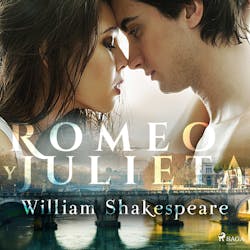
Romeo y Julieta
William Shakespeare
audiobookbook
Develop your General Culture in 500 Quotes
Winston Churchill, Confucius, Albert Einstein, William Shakespeare, Sun Tzu
audiobook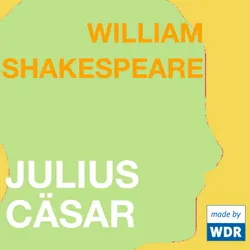
Julius Cäsar
William Shakespeare
audiobookbook
Die Komödie der Irrungen
William Shakespeare
book
Richard II
William Shakespeare
book
